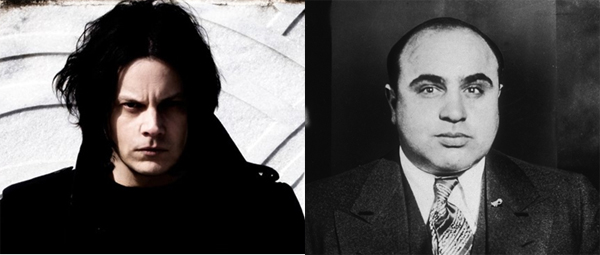How Al “Scarface” Capone Led Jack White to Dvořák

Jack White appears on the cover of the June Relix. Our conversation with White appears here but in the grand tradition of B-sides, here’s a bonus track which presents his account of how Al Capone led him to record Antonín Dvořák’s 1894 composition “Humoresque” as the closing selection on White’s new album, Boarding House Reach.
***
I’m looking for things all the time—whether it’s through antique stores or auctions or dealers and collectors. A lot of it is American history-based, but also preservation-based when it comes to music.
I have a lot of friends who know what I’m interested in, and Ben Blackwell, who works at Third Man Records, found an auction with what was described as “handwritten sheet music” by Al Capone. The description also indicated that while at Alcatraz, Al Capone convinced the warden to pay for music supplies—whatever “convinced” means, whether he paid off or had a gentlemanly conversation or threatened. [Laughs.] But, somehow, he convinced the warden to start a music program at Alcatraz and, supposedly, he had a band there called the Rock Islanders with Machine Gun Kelly on drums.
That’s all I knew: I didn’t know if he wrote this song; I had never heard of “Humoresque.” So I looked it up and said, “OK, it’s the 1930s. I’m going to look up ‘Humoresque 78.’” I couldn’t find anything so I thought, “Maybe it’s a song he wrote?” I had no idea.
I won the auction, and when I went to New York to record this album, there were five or six musicians I was working with. I asked if any of them knew how to read music. I can read, but I do so very slowly. However, in a few minutes Neal Evans and Louis Cato were able to read it and play it. We all immediately thought, “Wow, what a beautiful song!”
I didn’t even perform on it; they were recording it on piano and drums. While they were doing that, the manager of the place [Roberta Findlay]—she’d been there the whole three days but had never said anything to us except “good morning.” But she heard this music, came into the control room and asked, “Why are you playing ‘Humoresque’ by Dvořák?” It struck her as such a weird thing in the middle of everything else we were recording. I asked her what she meant and she explained that it was a classical piece.
So I thought, “Well, that explains the music. Now, what’s with the lyrics? Did Al Capone write these lyrics?” So we recorded it and I sang it, still not knowing really what was going on with it. Then, I came home and did some more looking around on the internet. It took a couple months but I finally found a website where somebody had recorded a piano player and a female singer performing several different versions of lyrical attempts at “Humoresque.” They ranged from what we had—which was done by a guy named Howard Johnson—all the way to some really bawdy stuff like, “Do not use the bathroom while the train is in the station.” This person’s site explained that many attempts had been made to put lyrics to this melody because everyone loved the melody so much.
From all of that, I can think of two possibilities: While Al Capone was in Alcatraz, he either remembered this version from sheet music he had owned at some point in his life, or he got a copy of that sheet music as part of the music program in Alcatraz and made a handdrawn copy of it to give to another band member so they could both read it at the same time. That’s all I know.
After that, we found a picture of Al Capone playing a tenor banjo, which is a bizarre offshoot to be interested in. All of it is so wild and unbelievable. You have this band with Machine Gun Kelly, and it’s at Alcatraz! I mean, if you put this in a movie, people would say, “There’s no way—this is unbelievable.” It would never work. I mean imagine putting that in The Untouchables? It would look ridiculous. [Laughs.]
But it is a beautiful song. So we recorded it, gave everyone their proper credits and now it closes out the album.



















